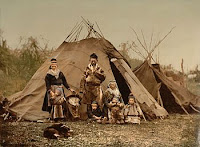Music and ethno-musicology constitute about half of the content in this blog. The author has spent a lifetime exploring unique and often inaccessible musical traditions. From the Ladino music of former Spanish Jews, to the mysteries of Roma music and the joyous tunes of the Balkan states; a lot of ground, time and cultures are covered.
As readers may have learned, I am fascinated by traditional music performed by powerful women. Lately I've found some amazing tunes, and uncovered a fascinating bit of history and ethno-musicology in the process. Here's how it all got started.
I was fleshing-out the "Metal playlist" on my YouTube channel, which has ended up with primarily Scandinavian bands. That just kind of happened, and looking back...my interest was piqued. Just what was it about this music that appealed? I drilled down and realized that a lot of the music I found appealing contained elements of traditional, even folk music. In a Pagan kind of way, which made it even better.
YouTube has the added value and convenience of suggesting videos based on prior user choices. I like that and have found some awesome material by experimenting with those suggested links. I recently stumbled on Sami traditional folk music. And discovered Yoiking.
The Sami people are northern Europe's indigenous tribes. They are physically located in the northern/arctic regions of four countries: Finland, Norway, Sweden and Russia. They speak a unique language that has dialects based on tribe and geography. Sometimes called Laplanders, the Sami people were largely nomadic for centuries. They herd Raindeer.
They live in temporary, rustic dwellings - including Teepees. They are, in some ways, similar to indigenous peoples everywhere - including native Americans. They speak of "brother Bear" and "brother Eagle," they focus on the land and the seasons, live in harmony with nature and the animals. They have a long, Shamanic tradition and the power of the "northern Witches" is the subject of legends.
Back to Yoiking. Like some native american chants, Sami Yoiks are very special musical compositions - designed to "be" the thing or person that is their core subject. Yoiks are often creative vocalizations, and not words per se. A singer would not Yoik about a river, he/she would Yoik the river. So the resulting tunes are sometimes unfamiliar to modern ears, and it is necessary to get one's head around the representational nature of the art. The impact of a Yoik is not in the meaning of the lyrics, there often aren't any, it is in the IMPACT of the performance - which should take listeners to another place. This post, from a University of Texas School of Music blog, is very detailed and definitive. A great article for those who want to dig deeper and know more. And now, without further ado...Sofia Jannok of Sweden.
The ethereal sound of Mari Boine...
And the music of Elle Márjá Eira
You might also like:
AfroPop Music
Portugal's Fado
Spain's Musical Regions
Sunday, August 19, 2012
Thursday, August 9, 2012
Corruption - It's A New Plague
I came across this point-on video recently and deemed it totally worth sharing. We need to escalate the urgency of this conversation - as we grapple with increasing evidence of endemic corruption at every level of our private and public institutions.
Are Your Politicians For Sale? from Political Prostitution on Vimeo.
Are Your Politicians For Sale? from Political Prostitution on Vimeo.
Labels:
ACTA,
CISPA,
copyright,
Corruption,
ethics,
MPAA,
politicians,
politics,
RIAA,
transparency,
trust,
video
Subscribe to:
Comments (Atom)

